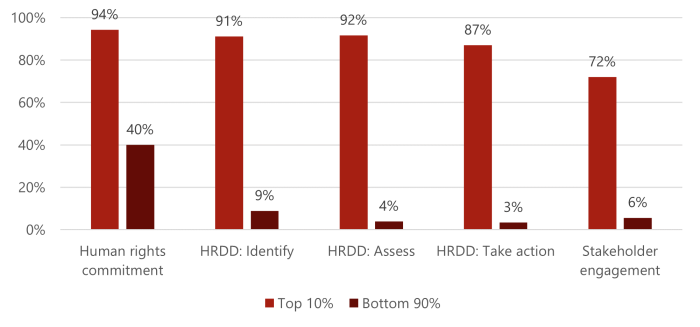Key finding
The 2,000 most influential companies are leaving hundreds of millions of people behind
The world’s 2,000 most influential companies are pivotal in driving economic growth and job creation as they directly employ roughly 95 million workers and hundreds of millions more indirectly through their supply chains. This great influence comes with a great responsibility to embrace the massive potential to drive positive change in the lives of many. However, our Social Benchmark shows that most of these companies fail to demonstrate the fundamentals of care and respect for people or how justice, inclusion and equity are embedded in their business practices.
FIGURE 1: PERCENTAGE OF OVERALL AVERAGE SCORE PER MEASUREMENT AREA

Companies on average do not meet even a quarter of their responsibilities to uphold socially responsible business conduct across any of the three measurement areas. 90% of the 2,000 companies assessed are not even halfway to meeting fundamental social expectations on human rights, decent work and ethical conduct. Alarmingly, over 30% of companies score between 0 and 2 points out of 20 total possible points, indicating little to no acknowledgement of their impact on people’s lives. It is increasingly apparent that the private sector is disregarding its crucial role in reducing poverty and inequality. In the context of the current cost-of-living crisis and rising inequalities, this gap is even more alarming.
When looking at the top 10% that surpass the halfway mark in the Social Benchmark, it is evident that these higher performing companies make a concerted effort to respect human rights. Each company has implemented at least one step of the human rights due diligence process. This involves identifying, assessing and addressing potential and actual human rights risks within a company’s operations and supply chains. Moreover, 94% of these companies have adopted commitments to respect human rights, and more than 70% identify and/or engage with stakeholders whose human rights have been or may be affected by their activities, compared with only 6% of the lower scoring companies. Overall, these companies show that respecting human rights and understanding their impact on people is fundamental to upholding socially responsible business conduct. This aligns with existing and forthcoming policy actions on due diligence, modern slavery and human rights reporting in East Asia, Europe and North America.
FIGURE 2: PERCENTAGE OF COMPANIES SCORING ON HUMAN RIGHTS INDICATORS

Most of the 2,000 companies – including the top 10% – score poorly on fundamental aspects of decent work, the lowest scoring measurement area overall. Nearly all companies (98%) fail to disclose their gender pay gap among employees across all countries of operation. In addition, 95% of companies do not publish the health and safety data of their workers such as the number and rate of work-related injuries and fatalities.
Regarding corporate ethical conduct, nearly 65% of companies fail to publicly commit to protecting the personal data of their employees and consumers, and 96% of companies do not publish a global statement about the types of user information they collect, share or access. With regards to responsible tax fundamentals, over 90% of the 2,000 companies do not disclose their corporate income tax payments for each jurisdiction in which they reside.
Overall, while the world’s 2,000 most influential companies have the potential to help tackle inequality and poverty, our Social Benchmark reveals significant shortcomings. As the 2030 deadline for achieving the SDGs approaches, the private sector’s inadequate performance and lack of transparency on key issues, especially amid growing inequalities, underscores the urgent need for stronger regulations and collective action to ensure meaningful contributions to sustainable development and social challenges. We need to raise the stakes and make doing the right thing consequential to business.